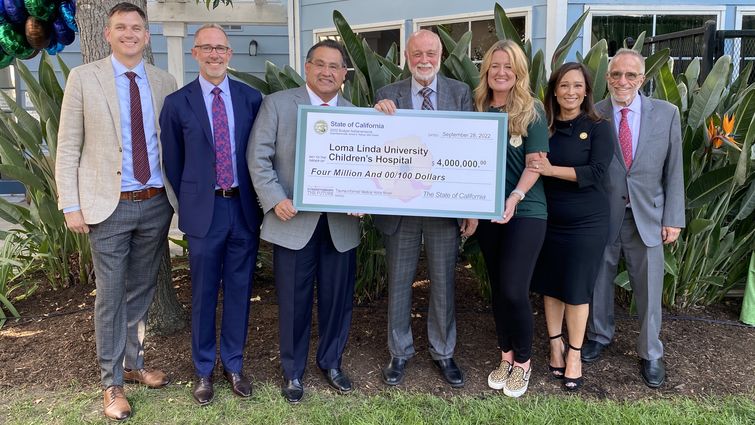
Loma Linda University Children’s Hospital received $4 million in state funding during a celebration ceremony Wednesday, Sept. 28 at the Resiliency Institute for Childhood Adversity. Assemblymember James C. Ramos (D-Highland) and Senator Rosilicie Ochoa Bogh (R-Yucaipa) presented the check to hospital representatives. Funds were part of a 2022-23 California state budget allocation intended to support a program that will provide seamless medical care and mental health services to Inland Empire children who have been victims of trauma, such as abuse, neglect, and maltreatment.
“This funding will make a significant difference in the lives and health of our region’s most vulnerable children,” said Trevor Wright, CEO of Loma Linda University Health Hospitals. “We will now be able to continue to provide mental health and physical care to youth who often fall through the cracks of the system. We deeply appreciate the efforts of James Ramos and Rosilicie Ochoa Bogh and their work to get this funding into this year’s California budget.”
Amy Young, MD, chief of the division of forensic pediatrics at Children's Hospital, was one of the leads in creating the program proposal, which was submitted to the state in 2019 but was held up by the pandemic. From there, Ramos and Ochoa Bogh were instrumental in lobbying for the program's support. Governor Gavin Newsom signed the funding into California's fiscal year budget on June 30.
In the hospital’s budget request to lawmakers, clinic staff wrote that they expected to see children with abusive head trauma, inflicted burns, fractures, abdominal injury, child sexual assault, medical child abuse, and severe neglect. A multidisciplinary care model will offer personalized pediatric treatment based on the child’s needs including developmental and nutritional assessments, dental evaluations, hearing and vision screenings, vaccinations and routine care. Speech and physical therapy as well as other allied healthcare evaluations would also be performed.
San Bernardino County has the second largest number of foster youth in California but no system of coordinated medical care for their children — meaning their medical care does not follow them. The Resiliency Institute for Childhood Adversity program will provide continuity of care for a population that is highly vulnerable, transient, and too often lacking in consistent access to medical care and emotional support.
